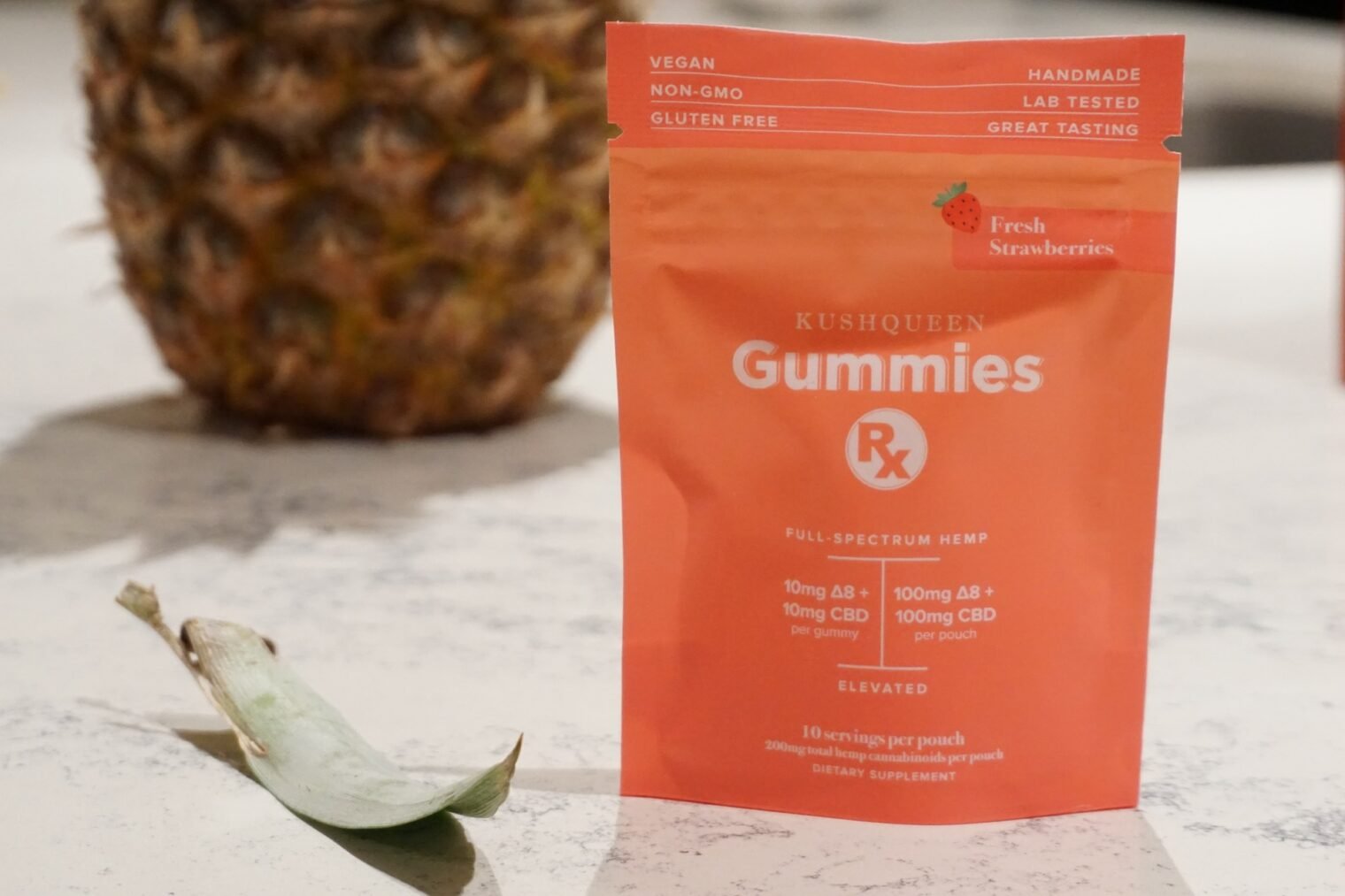Understanding the Effects of THC Gummies: What You Need to Know

Table of Contents
The effects of THC gummies can be eclectic at best. Many people enjoy THC gummies for their taste and the feeling they give. But not everyone knows how these gummies work in our bodies. THC, or tetrahydrocannabinol, is a key ingredient in cannabis that causes these effects.
Our article will share important details about THC gummies – from how they affect you to potential risks.
One fact to know: THC affects everyone differently based on factors like body weight and previous use. This article will help you understand these differences and more about safely enjoying THC gummies.
Keep reading to learn all you need to know!
How Do THC Gummies Affect Your Body?
Consuming THC gummies can lead to increased relaxation, relief from anxiety and pain, as well as the management of muscle spasms and seizures. These effects are a result of the interaction between THC and the body’s endocannabinoid system.
Increased relaxation
THC gummies are known for their ability to induce a sense of relaxation. By interacting with the body’s endocannabinoid system, these cannabis-infused edibles help relax the mind and ease physical tension.
These effects of THC gummies popular among users seeking to unwind after a long day or those looking to enhance their leisure time.
The relaxing properties of THC also play a crucial role in alleviating stress and improving mood. Many people turn to marijuana gummies as a way to gently soothe anxiety without the use of heavy pharmaceuticals.
With proper dosage and responsible consumption, individuals can experience enhanced calmness, paving the way toward relief from anxiety and pain.
Relief from anxiety and pain
THC gummies provide relief from anxiety and pain. They can reduce feelings of stress and discomfort, offering a sense of calm and ease. These effects can be particularly beneficial for individuals experiencing chronic pain or dealing with anxiety disorders.
The cannabinoids in THC gummies interact with the body’s endocannabinoid system to help manage these symptoms, promoting a more relaxed state.
Moreover, the analgesic properties of THC gummies can alleviate physical discomfort, providing temporary relief from various types of pain. This may be especially helpful for individuals suffering from conditions such as arthritis or neuropathic pain.
Management of muscle spasms and seizures
– THC can help manage muscle spasms and seizures in some individuals. It has been known to reduce the frequency of spasms and seizures, providing relief for people with certain medical conditions.
Additionally, some research suggests that CBD, a compound found in cannabis, may also play a role in managing muscle spasms and seizures. However, it is important to consult with a healthcare professional before using THC gummies or any other cannabis products for these purposes.
Other Effects of THC Gummies
THC gummies may offer potential health benefits and possible adverse effects on the body, including side effects, overdose, and accidental ingestion. Understanding these complexities is crucial for anyone consuming cannabis-infused edibles.
Potential health benefits
Consuming cannabis-infused edibles may offer potential health benefits. Some people report using THC gummies to manage chronic pain, reduce inflammation, and alleviate symptoms associated with conditions such as arthritis and multiple sclerosis.
Others have found relief from nausea and improved appetite after chemotherapy treatment by consuming edible THC products.
Additionally, CBD-infused edibles are believed to provide therapeutic effects for various mental health issues including anxiety disorders and depression. These products may also help individuals experiencing insomnia or sleep disturbances by promoting relaxation and improving overall sleep quality, contributing to a more balanced lifestyle.
Side effects and overdose
Consuming THC gummies can lead to various side effects, including dry mouth, increased heart rate, red eyes, and impaired coordination. Overdosing on THC gummies can result in symptoms such as extreme confusion, panic attacks, hallucinations, and vomiting.
In severe cases, overdose may require medical attention due to its potential impact on blood pressure and heart rate.
Abusing THC gummies by consuming them in large quantities or beyond the recommended dosage can lead to adverse health effects and even psychological dependency. Accidental ingestion by children or pets can also pose serious risks.
Possible adverse health effects
The consumption of THC gummies can lead to potential adverse health effects. Excessive use may result in increased heart rate, anxiety, and paranoia. Furthermore, overconsumption can lead to impaired motor coordination and judgment, which could result in accidents or injuries.
Long-term use of THC gummies may also impact memory function and cognitive abilities.
In addition, the psychoactive effects of THC can create dependency issues for some individuals leading to cannabis use disorder. This condition can have a detrimental effect on mental health and overall well-being if left untreated.
Accidental ingestion
Accidental ingestion of THC gummies can lead to unintended effects, especially if they are mistaken for regular candy. Ingesting edibles by mistake can result in increased heart rate, anxiety, and confusion.
When consuming THC gummies accidentally, individuals may experience dizziness or nausea that can be distressing. It’s crucial to store these products out of reach of children and pets to prevent accidental consumption.
Moreover, it is imperative to seek medical attention immediately if someone ingests THC gummies unintentionally, particularly when experiencing severe adverse effects. Prompt treatment can help mitigate the impact on overall health and prevent further complications from accidental ingestion.

Understanding the Differences Between Edibles and Smoking
Edibles and smoking differ in their onset time and potential for overdose. The potency of edibles is often unknown, creating a higher risk for accidental overconsumption compared to smoking.
Delayed onset and increased potential for overdose
THC gummies have a delayed onset of effects, which means it can take longer for users to feel the full impact compared to smoking cannabis. This delay increases the potential for accidental overdose as individuals may consume more thinking that the initial dose was ineffective.
Therefore, understanding the timing and potency of THC gummies is crucial to avoid adverse effects.
The delayed onset also presents challenges in managing dosage, as users may consume more before feeling the full effects. This poses a higher risk of unintentional overdose than with immediate-effect methods like smoking or vaping.
Unknown potency
The potency of THC gummies is not always consistent or easy to determine. Variability in the concentration of THC can lead to unpredictable effects on the body, making it challenging for consumers to gauge the appropriate dosage for their needs.
This lack of standardization increases the risk of accidental overdose and adverse reactions, highlighting the importance of being cautious when consuming THC-infused products. Understanding and accounting for this variability is crucial for safe and responsible consumption.
Navigating through the complexities of unknown potency underscores the need for clear labeling and regulation within the realm of cannabis edibles to ensure that consumers are well-informed about what they are ingesting.
Increased risk for self-harm or harm to others
THC gummies, when consumed in excess or by individuals with a predisposition to mental health issues, can lead to an increased risk of self-harm or harm to others. This heightened risk is particularly concerning for those who may experience negative psychological effects from THC consumption.
It is crucial to be mindful of the potential impact on mental wellbeing and consider the implications prior to consuming THC-infused cannabis products, especially when there are existing vulnerabilities.
In instances where vulnerable individuals consume THC gummies without supervision or knowledge of its potentially adverse effects, there is an elevated risk of self-harm or harm to others.
Seeking Treatment for THC Gummies Misuse
Seeking treatment for THC gummies misuse involves exploring various treatment options tailored to the individual’s needs and identifying the risks associated with long-term use. It is crucial to understand the impact of misuse on overall health and seek help from professionals when necessary.
Treatment options
When seeking treatment for THC gummies misuse, individuals have several options available. Therapies such as cognitive-behavioral therapy can help address underlying issues and develop healthier coping strategies.
Additionally, support groups and outpatient programs can provide guidance and encouragement during the recovery process. Physicians may also prescribe medications to manage withdrawal symptoms or address co-occurring mental health conditions.
Risks of long-term use
Long-term use of THC gummies may lead to tolerance, dependence, and withdrawal symptoms. Prolonged consumption can also have adverse effects on memory, attention span, and learning ability.
Continued usage may increase the risk of mental health issues such as anxiety disorders and depression. Additionally, long-term cannabis use has been associated with respiratory problems and cardiovascular complications.
Excessive and prolonged intake of THC gummies can impact overall mental and physical well-being negatively by affecting cognitive function as well as increasing the risks for chronic health conditions such as heart disease.
Impact on overall health
Long-term use of THC gummies can have a significant impact on overall health. Prolonged consumption may lead to dependency and affect mental well-being. Regular ingestion could also result in adverse effects on memory, cognition, and emotional regulation.
It is crucial to consider the potential long-term consequences of using THC-infused products on general health.
The continuous intake of THC edibles may also impact physical health over time. Chronic use has been linked to respiratory issues and cardiovascular concerns in some cases. Understanding these potential risks is essential when considering the long-term impact of cannabis consumption on overall health, emphasizing the importance of cautious usage and seeking professional guidance when necessary.
Importance of using responsibly and seeking help when needed
Using THC gummies responsibly is crucial to minimizing potential risks and adverse effects. It’s important to adhere to recommended dosages and guidelines provided by healthcare professionals or product packaging.
Seeking help when needed, such as for managing dependency or dealing with unexpected side effects, can significantly impact your overall well-being. If you experience any concerning symptoms or struggle to control your consumption, reaching out for assistance from a medical professional or support group is essential in addressing the issue effectively.
By using THC-infused products responsibly and recognizing when help is required, individuals can better navigate the potential complexities of cannabis consumption while prioritizing their health and safety.
Conclusion
Understanding the Effects of THC Gummies: What You Need to Know
In understanding the effects of THC gummies, it’s crucial to consider their impact on your body and overall health. With increased relaxation and relief from anxiety, pain, muscle spasms, and seizures, THC gummies can offer potential benefits but also pose risks if not used responsibly.
Differentiating between edibles and smoking reveals important factors such as delayed onset, unknown potency, and increased potential for overdose with edibles. Seeking treatment for THC gummies misuse is essential to mitigate long-term risks on your health and well-being.


